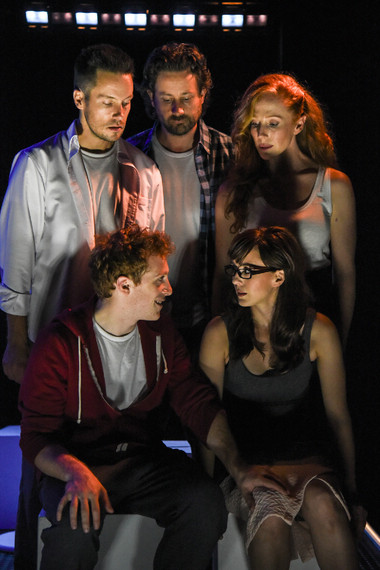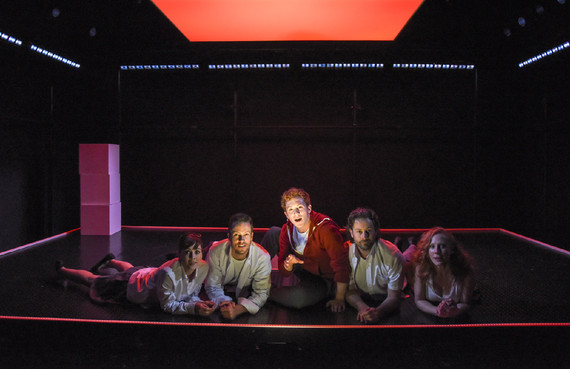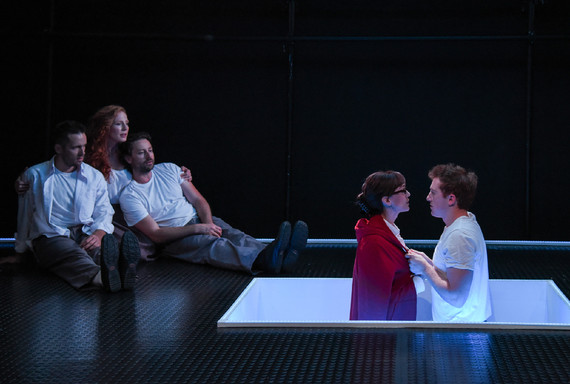Christina Bennett Lind, Danny Bernardy, Ethan Slater, Nick Flint, Sarah-Jane Casey. Photo credit: Russ Rowland.
"i don't know if you're still there, but... oh of course i know
why, red, of course it's because i love you,
her voice cutting through, startling them both, they look over
at me, lengthy silence
plus
will you just...say something if you're alright?" -- Kevin Armento
In the evolution game, cellphones have emerged as a new appendage, attached to the hand like an eleventh finger spurting awkwardly from the palm. They are second mouths, another means of communication that proves as natural as raising our voice, words spilling from our lips. In fact, they may be more instinctual a tool than the vocal cords, which require nerve and courage. As we tap on virtual keyboards to type a text, there's no need for a lion's heart; we can share our deepest secrets timidly, silently, hidden behind a screen.
Our desires, infatuations, fears and obsessions free fall onto the lit page, and we trail into a state of self-confession, almost dissociating the physical, fleshy being on the other side of our transmission from the message itself. The glossy veneer -- this feigned sense of anonymity and intimacy -- allows situations to progress that would never manifest in the "real world" that, in contrast to a virtual sphere, is dauntingly immediate. In its most evil form, the cellphone excuses the injuries we cause others, for we cannot see their bleary, dew-dropped eyes when we deliver bad news or worse, no news at all. We experience no ramifications for "ghosting," or for ignoring the emotions of another as we communicate with their phone, not with them. Out of shame, or else self-protection, we divorce ourselves from the device, a monitor that causes the heart to palpitate and break on a moment's notice. And yet this technology does not act of its own volition; we tell it to hurt, we initiate the pain.
It is this complex relationship that Brooklyn-based playwright Kevin Armento explores in his world premiere, Please Excuse My Dear Aunt Sally. The story sounds familiar: 15-year-old Red's parents separate, and he's redistricted to a new high school. One day while loudly clowning around in class, Red gets caught by his math teacher, who confiscates his phone as a punishment. Dissatisfied with her mundane, bland lifestyle and her bum boyfriend Donald, that night the teacher looks to her student's phone at first as a distraction. However, she soon finds a few saved, carefully rendered images of rocks piled on a beach that pique her interest, and she's riveted by his masked sensitivity. In the weeks to come, pupil and mentor text until one night, she sends an erotic selfie that inspires their affair.
If the work seems simple, it's not. The plot is deceptively so; an astute audience can anticipate the climax, but the narrator -- Red's phone -- stumbles blindly into disaster. In this dramatic irony lies power; something that appears so obvious from a human outlook is completely foreign and suspenseful for the phone's stream of consciousness, which cannot rationalize the behavior that leads to the play's conclusion. After all, innovators base technology on algorithms and data, properties that belong to a logical interpretation of the world. But Armento shows that humans are not always a logical species. Emotions, hormones and our animal instincts adulterate the sanity and induction depicted by the phone's psyche. Love seems the ultimate betrayal of good sense, the explanatory variable that drives both Red and his math teacher to jeopardize everything for each other.
This comparison between reality and the phone's perception of it provokes criticism of technology's dominating role today. Viewers don't understand the two protagonist/antagonists' motivations because as an unfeeling narrator, the phone can't digest, evaluate and repackage the irrational. This highlights a dilemma within our modern conversational model: either we must become more objective and unsentimental, or we should program technology to comprehend pathos. The current human condition, with all its passion, clashes with the cold reasoning of our screens. In Armento's story, a cell's impersonality causes immeasurable damage to a forgotten teenager sitting on his bed, staring at his own phone, waiting anxiously for a few promising words. 
Top Right to Left: Danny Bernardy, Nick Flint, Sarah-Jane Casey, Ethan Slater, Christina Bennett Lind. Photo credit: Russ Rowland.
Please Excuse My Dear Aunt Sally is presented by One Year Lease Theater Company, a collective of actors who produce edgy, contemporary plays for the New York public. OYL employs the Greek chorus system to create a "collective voice contextualized by each individual participant's different experience of a shared event," according to the group's website. Five OYL members comprise Armento's cast, all of whom offer a unique vision of the script as they take turns representing Red's cellphone. They also sometimes embody prominent figures in Red's life -- his mother, his father, Donald -- but they are still imagined through the lens of the phone and must be seen as reflections of people and not people themselves.
Indeed, the entire show exists in an alternate universe unlike our own, stuffed inside 59E59's warm, comfortable Theater B. James Hunting's set feels like it's lodged in a starry space, with that kind of empty expansiveness you feel under the Hayden Planetarium at the American Museum of Natural History. But instead of a galaxy, the actors crowd inside a cavernous device filled with invisible data. A monitor looms above, and the middle of the stage is carved out so that Red and his teacher -- portrayed by Ethan Slater and Christina Bennett Lind -- can dive below to be viewed from the phone screen's angle of perspective. As movement director, Natalie Lomonte lends gorgeous gesture to the theater piece; Slater swings on rigs surrounding the platform, and the "chorus" piles into formations reminiscent of a smart phone's shape and curvature.
Danny Bernardy, Sarah-Jane Casey, Nick Flint, Christina Bennett Lind, Ethan Slater. Photo credit: Russ Rowland.
The general effect of these combined elements pleases and amuses the mind's eye. Please Excuse My Dear Aunt Sally does not feel polished, and it certainly doesn't benefit from the mass appeal of Wicked or The Book of Mormon. But for the inquisitive millennial who's grown up in a technologically obsessed culture, it screams of novelty. Armento pushes boundaries, challenging his spectator to engage with the modern environment instead of ignorantly accepting it. He wittily comments on the virtual phenomena that control our society, making us question whether our phones are friend or foe. What's our responsibility when we use them? Are they innocent?
... Are we?
With the ever-increasing lack of accountability that technology elicits, it's time that someone asks us what our dashed-off message or radio silence means. Are we ready to not feel?
For Armento, the answer is a stark "no." Red's hurt. His teacher, too. No one walks away unscathed. And the audience empathizes because these days, most of us know how it feels to have our hopes shattered by a screen.
Please Excuse My Dear Aunt Sally plays at 59E59 through October 24. Tickets are $35.

